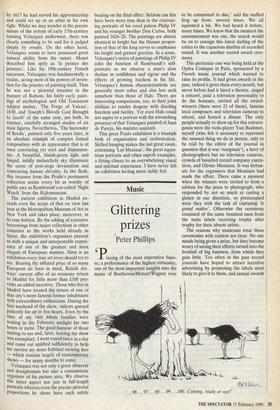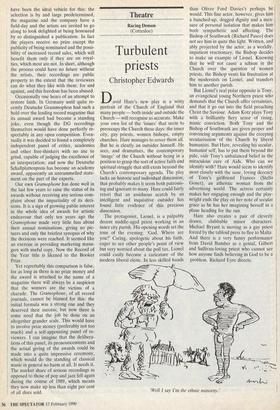Music
Glittering prizes
'Peter Phillips
laying of the most impressive fines- se; a performance of the highest virtuosity; one of the most important insights into the music of Beethoven/Mozart/Wagner ever to be committed to disc,' said the stuffed frog up front, several times. We all squirmed a bit. We had heard it before, many times. We knew that the moment the announcement was out, the search would be on to consign this latest darling of the critics to the capacious dustbin of recorded sound, It was another record award cere- mony.
This particular one was being held at the Opera Comique in Paris, sponsored by a French music journal which wanted to raise its profile. It had given awards in the past, indeed it gives them every month, but never before had it hired a theatre, staged a concert, paid a television personality to do the honours, invited all the award- winners (there were 21 of them), famous local composers and television cameras to attend, and hosted a dinner. The only people actually to show up for this extrava- ganza were the viola-player Yuri Bashmet, myself (who felt it necessary to represent the unusual thing we do in person, only to be told by the editor of the journal in question that it was `marginak'), a bevy of photographers but no television cameras, crowds of besuited record company execu- tives, and Olivier Messiaen. It was fortun- ate for the organisers that Messiaen had made the effort. There came a moment when the winners were invited to form a tableau for the press to photograph, who responded by not so much as casting a glance in our direction, so preoccupied were they with the task of capturing 'le grand maitre'. Otherwise the ceremony consisted of the same besuited ones from the main lahels receiving trophy after trophy for their absent artists.
The reasons why musicians treat these ceremonies with caution are clear. No one minds being given a prize, but they become weary of seeing their efforts turned into the football of big business, from which they gain little. Too often in the past record journals have hoped to attract lucrative advertising by promoting the labels most likely to give it to them, and annual awards
`. , .96 ...97 .. .98 • .99 . .100. Coming, ready or not!'
have been the ideal vehicle for this: the selection is by and large predetermined, the magazine and the company have a field-day and the artists are invited to go along to look delighted at being honoured by so distinguished a publication. In fact the players receive no prize except the publicity of being nominated and the possi- bility of increased record sales, which will benefit them only if they are on royal- ties, which most are not. In short, although the process could have no future without the artists, their recordings are public property to the extent that the reviewers can do what they like with them, for and against, and this freedom has been abused.
Occasionally one hears of an attempt to restore faith. In Germany until quite re- cently Deutsche Grammophon had such a hold over the leading record magazine that its annual award had become a standing joke, even though the DG recordings themselves would have done perfectly re- spectably in any open competition. Even- tually it was decided to found a completely independent panel of critics, academics and other free-thinkers with no axe to grind, capable of judging the excellence' of an interpretation; and now the Deutsche Schallplattenpreis has become an academy award, apparently an untrammelled state- ment on the part of the experts.
Our own Gramophone has done well in the last few years to raise the status of its awards without receiving any serious com- plaint about the impartiality of its deci- sions. It is a sign of growing public interest in the whole idea of awards for artistic endeavour that only ten years ago the Gramophone made very little fuss about their annual nominations, giving no pic- tures and only the briefest synopsis of why the decisions were reached. It seemed like an exercise in providing marketing mana- gers with useful copy. Now the Record of the Year title is likened to the Booker Prize.
Yet regrettably this comparison is false, for as long as there is no prize money and the award is attached to the name of a magazine there will always be a suspicion that the winners are the victims Of a charade. The Gramophone, of all record journals, cannot be blamed for this: the initial formula was a strong one and they deserved their success; but now there is some need that the job be done on an altogether grander scale. This would have to involve prize money (preferably not too much) and a self-appointing panel of re- viewers. I can imagine that the delibera- tions of this panel, its pronouncements and the actual giving of the awards could be made into a quite impressive ceremony, which would do the standing of classical music in general no harm at all. It needs it. The market share of serious recordings as opposed to those of pop and jazz fell again during the course of 1989, which means they now make up less than eight per cent of all discs sold.



















































 Previous page
Previous page